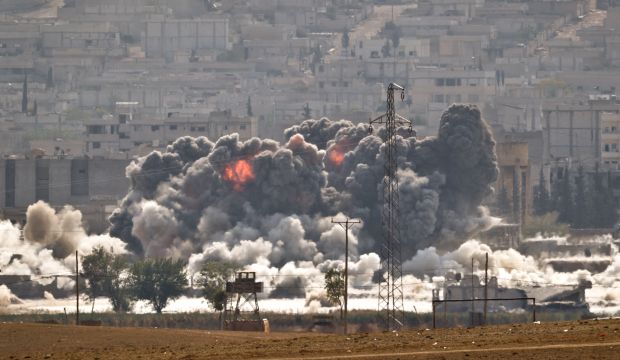
This October 28, 2014 file photo shows smoke and flames rising from an Islamic State of Iraq and Syria (ISIS) position in the northern Syrian town of Kobani, seen from the Turkish–Syrian border, during airstrikes by the US-led coalition targeting ISIS in Syria and Iraq. (AP Photo/Vadim Ghirda)
Beirut, Asharq Al-Awsat—The US-led coalition targeting the Islamic State of Iraq and Syria (ISIS) launched airstrikes against the extremist group’s stronghold in Syria, located in the country’s northeast, the US Department of Defense said on Sunday.
A total of 11 airstrikes struck ISIS positions near Aleppo, Raqqa, Al-Hasakah, and Kobani between Saturday and Sunday morning, officials said, destroying a number of ISIS positions in the area as well as equipment, including anti-aircraft artillery and rocket launchers as well as vehicles.
The UK-based Syrian Observatory for Human Rights, which monitors the conflict via a network of local correspondents, said the airstrikes carried out in Aleppo coincided with fierce clashes on the ground between ISIS fighters on one side and those from jihadist group Ahrar Al-Sham and the Al-Qaeda-affiliated Al-Nusra Front on the other.
The strikes also coincided with fierce fighting in Al-Hasakah, where fighters from the Kurdish People’s Protection Units (YPG), an armed Syrian–Kurdish separatist group, clashed with ISIS fighters.
The YPG recently entered the fight in the northeastern city, where ISIS is also battling Syrian government forces loyal to President Bashar Al-Assad.
Nasser Haj Mansour, a local Kurdish official, told Asharq Al-Awsat the YPG, which previously said it would not get involved in fighting between ISIS and government forces, launched attacks on ISIS in Al-Hasakah following the army’s withdrawal from several checkpoints near the western entry-point to the city.
He said ISIS fighters had now also withdrawn, to more than 1.2 miles (2 kilometers) away from the city, after being close to entering following the withdrawal of the Syrian government troops.
ISIS fighters would have entered the city were it not for the intervention of the Kurds, Mansour said, who also insisted there had been no coordination between the YPG and Syrian government troops.
“The entry of the Kurds [into the fight in Al-Hasakah] was done in order to protect the city [from ISIS’ fighters], and was carried out in coordination with the international [anti-ISIS] coalition and not the Syrian government,” he said.
Rami Abdulrahman, head of the Syrian Observatory, said the Kurdish fighters entered after criticisms were leveled at them by locals who wanted them to participate in the fighting in order to protect the city from ISIS fighters seemingly poised to enter Al-Hasakah following the Syrian army’s withdrawal.
Locals in Al-Hasakah, which has a large Kurdish population, held several meetings last week formally calling on the YPG to block the ISIS advance.
The YPG has thus far been wary of fighting ISIS in the area, for fear of being seen to fight alongside the Syrian army. The group is the armed wing of the northern-based Syrian–Kurdish Democratic Union Party (PYD), which has been working to achieve autonomy for Syria’s Kurds and has faced years of brutal repression by the Syrian regime.
The coalition strikes in northeastern Syria coincided with others carried out on ISIS positions in Iraq. Syria’s northeastern region has been an ISIS stronghold since 2013, after the group seized Raqqa, declaring it its headquarters in Syria. ISIS’s increasing presence in the strategic northeastern area allows the group to transport fighters to neighboring Iraq, where it occupies considerable swaths of the country’s northwestern region.
Salim Naseef contributed additional reporting from Beirut.
